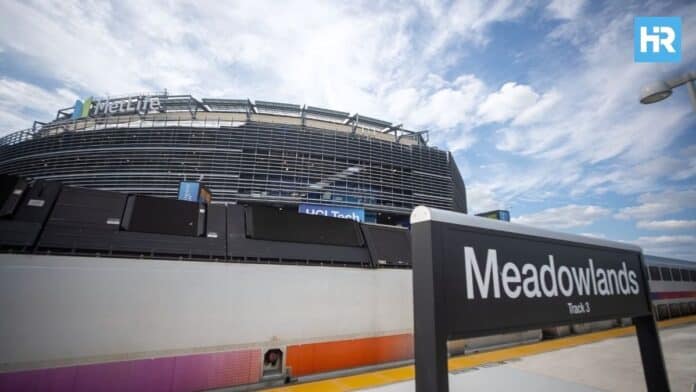NJ Transit is preparing for the 2026 World Cup Final at MetLife Stadium, aiming for a seamless experience for fans with enhanced services and strategic planning.
[su_box title=”Key Takeaways” box_color=”#003F81″ title_color=”#ffffff” radius=”9″]
- MetLife Stadium to host the 2026 World Cup final, spotlighting New Jersey on the global stage.
- NJ Transit aims to replicate the success of past large events, avoiding previous transportation challenges.
- Infrastructure and planning improvements are underway to accommodate the expected influx of international visitors and daily commuters.
[/su_box]
NJ Transit’s Preparations
MetLife Stadium in East Rutherford, New Jersey, has been chosen as the prestigious venue for the 2026 World Cup final, spotlighting New Jersey on the global stage. This decision marks a significant victory for Governor Phil Murphy and showcases the state’s commitment to facilitating an unforgettable experience for soccer fans worldwide.
NJ Transit’s Challenge and Strategy
With the expectation of hosting eight World Cup matches, including the grand finale on July 19, NJ Transit is under pressure to deliver flawless transportation services, reminiscent of its success in ferrying 80,000 Taylor Swift fans without a hitch. The agency aims to replicate this success and avoid past mishaps experienced during events like the 2014 Super Bowl and WrestleMania 35, which were marred by transportation delays and logistical nightmares.
Infrastructure Improvements and Plans
To ensure fans have a great time and don’t face any trouble, NJ Transit is committed to significantly improving its services for the World Cup, aiming for a top-notch, reliable transportation network. This network will be ready to manage the large number of people coming from different parts of the world and everyday commuters. The agency’s leadership has underscored their commitment to providing a seamless transportation experience from when fans board an NJ Transit train or bus.
Potential Challenges
One of the main logistical challenges lies in the unique timing of the World Cup matches, with several games scheduled during the week. This situation could create conflicts between World Cup visitors’ demands and New Jersey commuters’ daily needs, highlighting the importance of a balanced approach to transit planning and operations.
As New Jersey gears up to welcome the world for the 2026 World Cup, NJ Transit’s preparations are crucial for ensuring that the event is a celebration of soccer and a testament to the state’s ability to host major global events. The collaboration between New Jersey and New York as dual hosts signifies a united front in delivering a world-class experience for fans and players.








![Best Jersey City Restaurants [current_date format=’Y’]: Which NJ Restaurants Live Up to the Hype?](https://staging.hudsonreporter.com/wp-content/uploads/2024/06/Jersey-City-Restaurants-324x160.jpg)



![Best Bitcoin Casinos in [current_date format=’Y’] – Top 10 Crypto Casino Sites for BTC Games Bitcoin Casinos](https://staging.hudsonreporter.com/wp-content/uploads/2024/01/bitcoin-casinos-feature-324x235.jpg)
![[current_date format=’Y’]’s Best Bitcoin eSports Betting Sites – Where to Bet on eSports with Crypto bitcoin esports betting](https://staging.hudsonreporter.com/wp-content/uploads/2023/12/bitcoin-esports-betting-sites-1-100x70.jpg)
![Best Bitcoin Casinos in [current_date format=’Y’] – Top 12 Crypto Casino Sites for BTC Bonuses Bitcoin Casinos](https://staging.hudsonreporter.com/wp-content/uploads/2024/01/bitcoin-casinos-feature-100x70.jpg)
![Best Ethereum Casino Sites – Top 10 ETH Gambling Sites with Fast Payouts [[current_date format=’Y’] Update] ethereum casinos](https://staging.hudsonreporter.com/wp-content/uploads/2023/09/ethereum-casinos-100x70.jpg)
![Best Dogecoin Casinos for [current_date format=’Y’] – Top DOGE Gambling Websites for Fast Payouts [Updated] dogecoin casinos](https://staging.hudsonreporter.com/wp-content/uploads/2023/06/dogecoin-casinos-feature-100x70.jpg)
![Best Bitcoin Casinos in [current_date format=’Y’] – Top 10 Crypto Casino Sites for BTC Games Bitcoin Casinos](https://staging.hudsonreporter.com/wp-content/uploads/2024/01/bitcoin-casinos-feature-324x160.jpg)
![[current_date format=’Y’]’s Best Bitcoin eSports Betting Sites – Where to Bet on eSports with Crypto bitcoin esports betting](https://staging.hudsonreporter.com/wp-content/uploads/2023/12/bitcoin-esports-betting-sites-1-324x160.jpg)
![Best Ethereum Casino Sites – Top 10 ETH Gambling Sites with Fast Payouts [[current_date format=’Y’] Update] ethereum casinos](https://staging.hudsonreporter.com/wp-content/uploads/2023/09/ethereum-casinos-324x160.jpg)
![Best Dogecoin Casinos for [current_date format=’Y’] – Top DOGE Gambling Websites for Fast Payouts [Updated] dogecoin casinos](https://staging.hudsonreporter.com/wp-content/uploads/2023/06/dogecoin-casinos-feature-324x160.jpg)
![Best Ontario Sports Betting Sites – Top ON Legal Sportsbooks Online ([current_date format=’Y’]) Ontario Sports Betting](https://staging.hudsonreporter.com/wp-content/uploads/2024/04/Ontario-Sports-Betting-324x160.jpg)
![[current_date format=’Y’]’s Best Illinois Sports Betting Sites: Top 10 IL Online Sportsbooks [Updated] Illinois Sports Betting](https://staging.hudsonreporter.com/wp-content/uploads/2024/04/illinois-sports-betting-1-324x160.jpg)
![Best Betting Sites Not on BetStop Australia: Top Non-BetStop Bookies for Aussies [[current_date format=’Y’] Update] Betting Sites Not on Betstop](https://staging.hudsonreporter.com/wp-content/uploads/2024/04/Betting-Sites-Not-on-Betstop-324x160.jpg)
![Best Sports Betting Sites Georgia – Top 10 GA Online Sportsbooks [[current_date format=’F Y’] Update] Georgia Sports Betting](https://staging.hudsonreporter.com/wp-content/uploads/2023/11/Georgia-Sports-Betting--324x160.jpg)
![Euro [current_date format=’Y’] Betting Odds – Top Winner Odds for the UEFA European Cup, UK Edition [Update] euto 2024 odds](https://staging.hudsonreporter.com/wp-content/uploads/2024/04/euto-2024-odds-324x160.jpg)